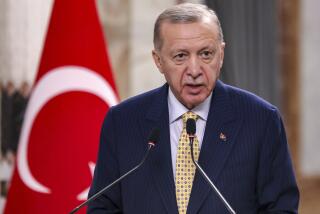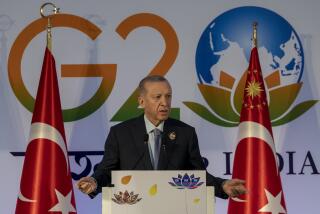Long a Wallflower, Istanbul Casts a Wary Eye at its Western Suitors : Turkey: Will its new relationship with the West, as a result of the gulf crisis, outlast the strategic spotlight now shining on Ataturk’s republic?
- Share via
ISTANBUL, TURKEY — Kemal Ataturk looked at his men at Gallipoli and commanded: “I don’t order you to attack. I order you to die.” Those words, and that battle, marked the birth of modern Turkey. The Turkish line stiffened and held; for the first time in modern history the Turks defeated Western forces in a major battle.
Credited by friend and enemy alike with the victory at Gallipoli, Ataturk went on to overthrow the Ottoman sultan, save Constantinople from the British, drive the Greeks out of Asia Minor and establish the Turkish republic. But Ataturk was an unusual revolutionary. He neither wanted to conquer the West, like Lenin, nor turn his back on it, like Gandhi.
Ataturk, who corresponded in French with close friends and died of the least Muslim of diseases--cirrhosis of the liver--wanted Turkey to become part of the West. He imposed a secular constitution on a profoundly Islamic population, emancipated women and subjugated the powerful Ottoman clergy to secular control.
Today, with its strategic position in the gulf crisis, Ataturk’s republic is basking in new attention from the West. A good kid in a bad neighborhood, Turkey goes to school, does its international-finance homework, and doesn’t hang out with Russia, Syria, Iraq and Iran, the hoods who live next door. Turkey faithfully attends all NATO’s scout jamborees. It doesn’t throw rocks through Israel’s windows like all the other kids in the Middle East, and it is nice to old ladies like Kuwait.
But if Turkey doesn’t hang out with the bad kids, it has trouble with the good ones. Too democratic and Western for Iraq, Turkey is too authoritarian, too Eastern and, above all, too poor to hang out with the rich kids in the European community. Everybody approves of Turkey, more or less, but nobody wants to go out with it on Saturday night.
Economically, Turkey made great strides in the last generation, but with its population exploding, living standards have stagnated even as output continues to grow. Inflation, now hovering somewhere near the frightening level of 60% per year, erodes the purchasing power of most people’s wages, and the Turks are unable to keep up. The monthly minimum wage covers only half the basic living expenses of a family of four in crowded, polluted Istanbul. Both Iraq and Kuwait were major purchasers of Turkish goods and Iraq, in particular, was a vital source of oil. Thus, the collapse of trade with those two countries in the current crisis has worsened an economic outlook that was already troubled.
Economic pressures affect Turkish relationships with the West. On the one hand, the potential for social conflict is so great that Turkey’s fragile democratic institutions have been tested beyond their limits. A wave of terrorism led to a military coup 10 years ago, and Turkish politics have yet to recover their balance. Journalists have been jailed on various pretexts and the poorest part of the country--largely inhabited by Kurds--is the scene of frequent battles between security forces and separatists.
This spectacle does little to endear Turkey to Western Europe. Moreover, many Turks seek to escape their economic problems at home by finding work abroad. But Europe wants no more Turkish gastarbeiters, and tight visa restrictions make many Turks virtual prisoners within their country.
Turkish prospects for integration with Europe have recently dimmed. Until the fall of the Soviet empire, Turkey’s application for membership in the European Community seemed to be moving ahead, if slowly--and with Greece threatening veto at every step. Now, Turkey must stand in line behind countries like Poland, Czechoslovakia and Hungary for both membership and economic aid.
Against this background, some voices in Turkey call for a re-evaluation of the country’s basic decision to look West rather than East. Specifically, this takes the form of an increase in public support for an Islamic rather than a secular state. Enrollment in private religious schools--an alternative to the secular state system--is growing by leaps and bounds. The outward signs of Islamic fervor, especially the conservative dress of women, are becoming more widespread.
Matters are not helped by the twists and turns of Western policy. Before Iraq’s occupation of Kuwait, the West was turning its back on the Turks. With the Soviet Union no longer a threat, NATO, and therefore Turkey, were seen to be losing importance. This was a short-sighted attitude to take toward a country whose strategic location has placed it at the center of power politics since the Trojan War; worse, it helped confirm Turkish suspicions that the West only wants to use Turkey, not to welcome it into the club.
This impression is reinforced by the contrast between the close military ties that bind Turkey to the West and the much weaker cultural and social links. The West still has problems coming to terms with this Islamic society on the edge of Europe.
Thanks to Saddam Hussein, Turkey is once more a courted and valued Washington ally. Turkey’s president, Turgut Ozal, received the red-carpet treatment on his recent visit to Washington. But the quick transition has left a bad taste here, strengthening the impression that Washington, and even more Western Europe, still see Turkey as a pawn, not a partner.
Genuinely good relations between the West and Ankara depend on the realization that Turkey’s importance goes far beyond the gulf crisis. Turkey’s value in enforcing sanctions, and its potential weight in any military conflict with Iraq are important, but long after Hussein has gone to his everlasting reward, Turkey will remain an important factor on the international scene. Turkey is an Islamic, Middle Eastern country that is making a serious effort to become an advanced industrial democracy on the Euro-American model.
Economically, culturally and politically, Turkey can be a great value as a bridge between Europe and Asia, and between the often hostile great religions that sprang from the ancient Middle East. The gap between the rich Christian countries north of the Mediterranean and the poor Muslim countries along its southern shores is one of the great fault lines in world politics today. This fissure has produced great quakes in the past, is partly responsible for the present gulf crisis, and is likely to cause much more trouble in the future.
Turkey, with all its problems and limitations, with its deficient human-rights record, its imperfect democracy and its often too assertive stance vis-a-vis its neighbors, remains the one country in the region that is actively striving to close the gap. “Peace at home, peace abroad,” was the slogan Ataturk used to describe the basic policies of his republic. The West must work harder to help Ataturk’s heirs reach his goals.
More to Read
Sign up for Essential California
The most important California stories and recommendations in your inbox every morning.
You may occasionally receive promotional content from the Los Angeles Times.













